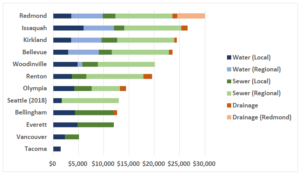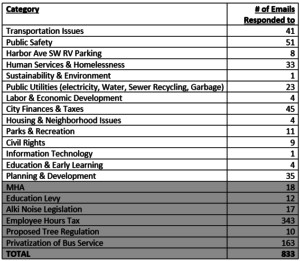Bus Service for Delridge; Developer Impact Fees; Duwamish Valley Action Plan; Duwamish River Opportunity Fund Taking Applications; June Constituent Email Report;
Transportation Benefit District Changes Allow for Additional Service for Delridge
Last week the City Council passed legislation amending the criteria for Seattle Transportation Benefit District (STBD) spending; under state law, these funds can only be used for transportation purposes.
One of the key changes is to amend the spending criteria to allow the STBD to fund additional service for Route 120 (planned for conversion to the RapidRide H Line). The current formula sharply limits STBD spending on this line, in contrast to the C Line, where STBD funds cover 1/3 of service hours, which has resulted in a 40% increase in ridership.
Route 120 is one of the priority routes for SDOT to improve frequency; SDOT is working with Metro to identify potential improvements that could be implemented in 2019.
In addition, the amendments allow for STBD spending on capital improvements for the Delridge Rapid Corridor project for the RapidRide H line.
Most of the STBD funds are dedicated to providing additional bus service in Seattle; here’s a link to the report about how the funds have been spent.
The original measure from 2014 allowed for $2 million for low-income transit riders; this legislation extends that for all Seattle Public School students. 2,680 cards were distributed for last year, which resulted in 444,000 trips, or 165 trips per card.
An Update on Developer Impact Fees for Water, Drainage, and Wastewater Infrastructure – as well as Transportation and School District Capital Projects
You may remember that during the Seattle Public Utilities (SPU) Strategic Business Plan update last year I heeded the recommendation from the Customer Review Panel to implement system development charges, and I wrote about it in my blog at the time. System Development Charges (SDCs) are one-time charges (similar to impact fees) on new customers to buy into or access the utility system. These charges are authorized by the State, but Seattle has been hesitant to implement these fees at all in some cases and in a full cost recovery capacity in other instances. However, most other jurisdictions utilize these charges in order to hold new development accountable for increased costs for the utility, rather than spreading the costs of this infrastructure to general ratepayers. Much like other types of impact fees (Parks, Transportation, and School impact fees authorized by the State), the graph below shows that Seattle just doesn’t take advantage of the opportunity to make sure developers pay their fair share in the same ways that other jurisdictions do.

Following the recommendations from the Customer Review Panel, I proposed an amendment to the Strategic Business Plan that requested SPU to “revise its water connection charge calculation methodology to include interest on existing assets, develop an implementation plan for sewer and drainage connection charges…” The purpose of this change is to ensure that growth is paying for growth and that SPU has an effective and efficient method to recover those costs.
In June SPU delivered their first report to Council which describes the work which needs to be completed in order to make a recommendation on legislative changes to the Council. The paper covers four main issue areas: SDCs Calculation (how to calculate the fees), Use of SDCs Revenue (where and how to spend the revenue), Latecomer Agreements (how to accommodate “first-in developments”), and Affordable Housing Development.
One important initial bit of progress that this report does not cover that SPU is moving forward with a customer engagement plan and Director’s Rule public review related to updating the water connection charge and water taps installation fee. Unlike the SDCs covered in the report, these changes do not require a code change to implement. SPU will also be updating other separate charges such as meter reads and meter testing fees. These changes are scheduled to go into effect in October 2018. Again, why should you care? Well, the closer SPU gets to full cost recovery for the costs associated with new customers using the system, the less these costs will be shifted to the general rate payer.
I appreciate the work that SPU has put into this report, and I have a better understanding of the complexity and possible paths forward in implementing responsible System Development Charges. However, growth and development are happening now, and the longer we wait the less effective these policies will be in generating needed revenue for the utility which will offset rate increases.
I intend on having SPU share this report with my committee this month so that we can publicly discuss the issues highlighted in the report and ensure that the utility is proceeding in a timely manner with their recommendations.
In case you are interested in Transportation Impact Fees, you might want to review this presentation in Councilmember O’Brien’s committee in March, see here. The Council’s next steps for implementing Transportation Impact Fees will be to update our Comprehensive Plan. Last summer the Council passed a resolution that established the 2018 docket of proposed amendments to the city’s Comprehensive Plan (the document that guides how we grow). The resolution directs city departments to analyze and propose amendments to our Comprehensive Plan establishing an impact-fee program. We had planned to vote on these Comprehensive Plan changes in the first quarter of 2018. See here from last summer’s Seattle Times editorial authored by Councilmember O’Brien, Bagshaw, and myself. Because there has been an appeal to the City’s Final Environmental Impact Statement for the Mandatory Housing Affordability (MHA) program and MHA implementation would require several Comprehensive Plan Amendments, the Comp Plan update originally planned for 1st Quarter 2018 has been delayed until after resolution of the MHA FEIS Appeal.
Finally, as it relates to School Impact Fees to help minimize the size of the future School Levy for Capital Facilities and the impact on property taxed, the city has to develop interlocal agreements in collaboration with Seattle Public Schools in order to enact impact fees for schools. In February, the Seattle School District reported to the School District Board the goal of having a joint City/School District Memorandum of Understanding in place addressing, among other issues, the implementation of a School Impact Fees program by June.
Duwamish Valley Action Plan Released
Last week the City released the Duwamish Valley Action Plan.
Seattle’s Duwamish Valley Program is a multi-departmental effort focused on the Duwamish Valley neighborhoods of South Park and Georgetown, designed to advance the City’s and communities’ environmental justice and equitable development goals as outlined in the Equity & Environment Agenda and Equitable Development Implementation Plan. The release of the action plan is the culmination of efforts to date.
The Plan identifies over 90 near, mid, and long-term actions the City will take to deliver measurable community health and well-being outcomes. Priority areas include Healthy Environment, Parks & Open Spaces, Community Capacity, Mobility & Transportation, Economic Opportunity & Jobs, Affordable Housing, and Public Safety.
Some of the short-term things mentioned in the report are already completed, thanks to the advocacy of South Park residents working with my office and the Executive, such as adding street lighting in the alley between Cloverdale and Donovan, and hiring a public safety coordinator, as proposed by the South Park Public Safety Task Force.
The report is also available in Spanish , Vietnamese, and Somali.
Background information available at the Duwamish Valley Program resources page.
Duwamish River Opportunity Fund Taking Applications
The City of Seattle’s Duwamish River Opportunity Fund is taking applications for $250,000 for community-based projects that increase the Sustainability of these neighborhoods.
Applicants are encouraged to attend a workshop before applying. These workshops will review the application process and discuss the requirements for a good proposal. The workshops will be held:
- Wednesday, July 11 – 5:00 – 6:30 p.m. at South Park Community Center
- Thursday, July 19 – 5:00 – 6:30 p.m. at Counterbalance Brewing
The Request for Proposals and Application Materials are available at the Duwamish River Opportunity Fund webpage. Applications are due by July 30 @ 5 p.m.
June Constituent Email Report
Constituent correspondence is a very important task in my office. My staff and I spend time every day helping you improve our community, whether that’s through getting you help from a city department with our constituent case management services or giving you information about legislation that the Council is considering. The unshaded categories and numbers are problem-solving emails answered in June, what I refer to above as “case management services.” The shaded categories and numbers are emails answered in June related to policy or legislation the Council is considering.

Posted: July 6th, 2018 under Councilmember Herbold, Education, LGBTQ, Parks and Recreation, Public Health, Seattle Public Utliities, Transportation
Tags: constituent e-mails, Duwamish River Opportunity Fund, Duwamish Valley Program, public safety coordinator, Route 120, Seattle Transportation Benefit District, Strategic Business Plan, street lighting, Transportation Impact Fees

